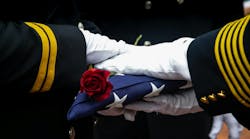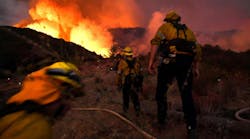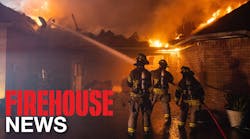This article will continue from where we left of last month. The last article provided the first seven tips to start you off on the right foot when you get hired as a firefighter. This article will provide you with the remaining seven tips to get you off on the right foot when you get hired as a firefighter.
8. When an alarm comes in, be the first one on the rig.
Be careful with this concept, it got me in trouble when I first started in the fire service. I tried so hard to be the first one on the rig (the ambulance) that I was so "worked up" and "amped up" that I had tunnel vision and put myself at risk of injuring myself or someone else on the way to the rig. There is no need to run to the rig (understand that every fire department is different in regards to this idea), a brisk walk can usually suffice. Being the first person on the rig ensures you will have your appropriate personal protective equipment (PPE) on and buckled in your seatbelt when the driver and officer look to see if everyone is present and accounted for.
9. Offer your help to anyone to do anything. One person works, all work.
I remember being on probation and having one of our volunteer firefighters riding along with us. I was doing the dishes and he was watching TV with the entire crew. Now I didn't have so much of a problem with that as I did with his comments afterwards. He started complaining how he wasn't getting hired and gave all of these excuses to why he should be hired. One of the senior firefighters told that volunteer firefighter that he needed to get off of his rear and start working with the probationary firefighter (me) because I obviously knew what it took to get hired and that it wasn't helping his cause sitting in the chair while I was working hard. The person had been a volunteer for over five years and had apparently gotten very comfortable with the crewmembers. Here is a situation where it was not going in his favor. He was so comfortable that he lost that drive and motivation and thought he was one of the crewmembers when in fact, he was still trying to prove to them that he wanted to be one of them. Coincidentally, eight years later, he is still trying get hired full time as a firefighter.
Also, when you see others at the firehouse that are doing work, and you have already completed your assigned duties, ask them if you can assist them with what they have to do. You're not there to do all of their work for them, but you are there to show that you are willing to be a team player when it came to getting things done around the fire station.
10. Respect seniority and rank.
Whether you agree or disagree with this is not the point. The point is that seniority is still regarded very highly in the fire service. In most departments, seniority determines vacation picks, station bids, as well as other important factors. Even if a person has one year of seniority on you, they are still senior to you. Embrace it and deal with it. You will have many senior firefighters (senior to you at least) giving you advice and their opinion. You don't have to always agree with what they say, but you should always thank them for their advice and show them the respect of their seniority and experience. Remember, it is easy to think that many of the "older firefighters" don't know as much as the younger firefighters do (because sometimes many of the younger firefighters are more educated and more skilled in certain topics such as computers and technology), but remember that in relation to the fire service, they have probably forgotten more than you have learned up to this point.
As for rank, remember that saying "rank has its privileges?" Well, don't forget that. One way it has its privilege is that while I don't necessarily have to agree with my boss on everything he asks me to do, I do have to respect him and follow those orders (assuming it is safe and legal to do so). On a structure fire last month, a firefighter I was supervising didn't agree with what the Incident Commander had ordered us to do. While there can always be a better way to do something (assuming you are open-minded individual), there is a time and place for everything.
On the scene of the fire with fire blowing out of both the second and first floor, that is not the time for me to disagree with the Incident Commander and not follow the orders I was directed to accomplish. I told the firefighter that I understood where he was coming from and I agreed with him to a point, but that now was not the time and place to argue, complain, or try and sway the Incident Commander into what might have been a better way about doing things. Remember, while I don't have to agree with what I'm ordered to do, I do have to do it (unless of course I want to be written up for insubordination). There is an old saying that ties in here "Mine is not do to reason why, mine is just to do or die."
11. Know your job and duties, and know them well.
The Battalion Chief that I worked under has just retired. I'm looking forward to working with my new Battalion Chief since I've worked under him before. He knows his job, he treats you fairly, you know what he expects of you, and he is one of the best Incident Commanders I have ever seen. Getting back to what he expects of you. I once heard a firefighter say that when they started working under this Battalion Chief, he told them one thing would keep them on his good side. That one thing was to just "Do your job!" I know it sounds easy and simple, but if you talk to many Battalion Chiefs, Captains, and Chief Officers, you will find that not every one always lives by those three words.
I think most firefighters will tell you they know their job and duties. How many truly know their job and duties and actually know them well? Good question. Challenge yourself to be that person that doesn't just know their job and duties, but knows them well and is willing to share that positive attitude to others, particularly the individuals senior to you and those new probationary firefighters that will eventually be below you.
12. Keep a low profile. Keep your opinions to yourself.
Every department has the "know it all" and the "I can top that story" or the "I think it is not right that this is occurring" folks. I heard it best from an experienced firefighter when I started in the fire service. He advised me to always be a sponge, to always learn from the good and bad of everyone, and to be careful when I am saying more than I am listening. All good ideas to live by on probation. I know how tough it can be when you first work with a new crew and you want to get to know them, or them to know you and/or your background and experiences. Be careful though, the last thing you want to do is get the reputation as a "know it all" or "person that has an opinion about everything." It isn't worth it.
Many firefighters believe that if you're on probation, you don't have enough time on the job to even have an opinion yet. Think about that thought and realize many firefighters still think that way. Don't offer your opinion unless it is asked for; even then, be very, very careful with your answer. You never know whom you will offend, create as an enemy, or spread what you just said around the department and to the other firefighters. Beware of the loaded questions (and many of them are loaded)! Many times, if you're being asked your opinion about something on probation, you're being tested. Don't fall for the bait! The last thing you want to do is talk bad about one of your classmates (even if you agree with it).
13. Assist in and around the kitchen, even if you are not assigned there.
As a probationary firefighter, it is always best to offer and assist with cooking and/or cooking preparation every shift. It shows your initiative and it also gets you the chance to get to know your crewmembers a little bit more. Now, I know one Captain in a neighboring department that tells me that he never lets his probationary firefighter cook because their time is better spent studying. I can somewhat agree with that (and that is definitely his choice and right to think that way), however if nothing else, I think assisting with cooking can help break the monotony of studying.
A person can only study so long before their brain goes to mush and the retention factor decreases. I also like the team-bonding/building skills that this can create, establish, or maintain. If you are not a good cook, don't offer to cook (you'll never hear the end of it). By assisting though, you'll be able to increase your knowledge in the kitchen. Also, let them know you want to learn to be a better cook. Many of the great firehouse chefs would probably be happy to show you some basic skills.
14. Remember, the reputation you establish now will follow you forever...
So well put. Remember that you never get the second chance to make that first impression. I tell probationary firefighters that all of the time. That reputations (and nicknames) you usually get are sometimes based on what you have done in your first few months and/or years on the job. If you have the reputation right out of the academy as being a jerk or know-it-all, guess what you'll be known as for the next 25 to 30 years. However, get the reputation of being a hard-worker and a detail oriented individual (and I don't mean in an "anal-retentive" way) during your probationary period and that will follow you around for years. Which reputation would you rather have? The choice is yours and its up to you to make the difference.





